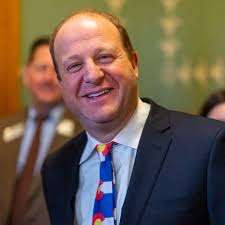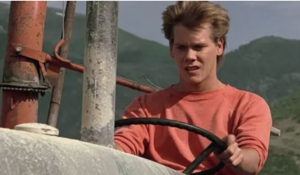 April 30, 2024 11:02 AM UTC
April 30, 2024 11:02 AM UTC

Governor Jared Polis, environmental leaders, and oil and gas executives have reached a consensus agreement to avoid a big fight at the ballot this fall in exchange for a new drilling fee to help fund public transit expansion in Colorado
As Chase Woodruff reports for Colorado Newsline:
Another game of ballot-measure chicken between Colorado environmental groups and the oil and gas industry has been called off, top Democrats at the state Capitol announced Monday.
For the third time in a decade, the two sides in Colorado’s long-running oil and gas wars have mutually agreed to withdraw competing sets of initiatives slated for the November ballot, avoiding what Colorado Gov. Jared Polis called “costly, risky and divisive” fights this November over whether the state should ban restrictions on natural gas, make it easier to sue drillers for health and safety violations and more. [Pols emphasis]
The deal also means Democrats will drop a series of legislative proposals targeting ozone pollution from the oil and gas sector. Instead, industry and environmental groups have agreed to endorse a package of clean air policies centered on a new per-barrel fee on oil and gas production, which will be used to fund public transit and wildlife habitat restoration…
…For decades, a nine-county region in and around the Denver metro area has failed to meet the Environmental Protection Agency’s health standards for ozone, a hazardous air pollutant linked to a wide variety of health problems. Significant local contributors to the region’s ozone problem, which peaks in the summer months, include oil and gas operations, gas-powered vehicles, lawn equipment and other industrial sources.
Under the proposal announced Monday, the new fee on oil and gas production would “fluctuate” based on commodity prices, said Senate President Steve Fenberg, a Boulder Democrat. Estimates based on average prices from the last several years show that it would generate roughly $138 million annually. Of that total, 80% would be used for transit and rail spending, while the remainder would fund conservation and restoration projects that aim to offset the negative impacts of oil and gas production.

According to a press release from the office of Governor Jared Polis, the coalition that worked on the agreement includes: Earthjustice, Conservation Colorado, Southwest Energy Efficiency Project, major oil and gas operators (Occidental, Civitas, Chevron), Green Latinos, CoPIRG, Earthworks, Western Resource Advocates, Healthy Air and Water Colorado. The agreement puts a stop to a bunch of competing proposals that would have crowded the 2024 ballot:
The 2024 ballot measures sponsored by the oil and gas industry included constitutional protections for “energy choice,” which would have barred state and local governments from restricting natural gas use in homes and businesses and from banning sources of pollution like gas-powered lawn and garden equipment.
The environmentalist-backed initiatives, filed last month, would have held oil and gas companies strictly liable for damages and created a private right of action to enforce environmental regulations. And the parts of Democrats’ ozone legislation that drew the strongest pushback from industry groups, including a summertime pause on drilling and fracking and a crackdown on “repeat violators” of air quality rules, are not included in the compromise legislation announced Monday.
The deal worked out by the Polis administration is reminiscent of a detente in 2008 involving a “Right to Work” ballot initiative between labor, business and elected officials that avoided an expensive and divisive ballot fight. A similar deal also took place in 2014, as Colorado Public Radio recalls:
In 2014, then-Gov. John Hickenlooper and then-Congressman Polis struck a bargain to avoid a costly ballot fight over fossil fuels. Industry groups and environmental advocates negotiated a similar deal in 2020, agreeing to pause any ballot initiatives while the state enacted a major law that overhauled its oil and gas regulations.
Achieving a consensus is certainly better than a bunch of dueling ballot measures in the fall — unless you are in the business of selling advertising on television. In the meantime, lawmakers will have to scramble to finish up legislation achieving these shared goals before the May 9 end of the legislative session.
Subscribe to our monthly newsletter to stay in the loop with regular updates!
Comments